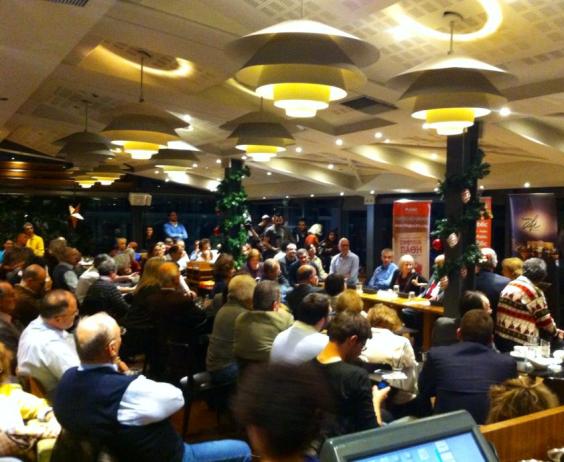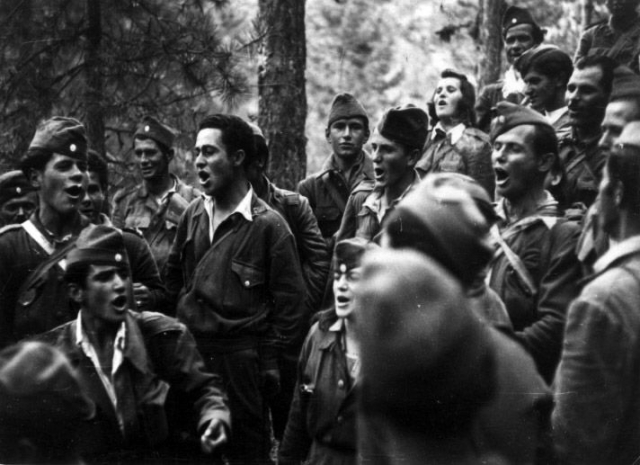Photo: General Secretariat for Press and Information
Anastasia Balezdrova
The Greek Civil War ended in August 1949 with the capitulation of the Democratic Army of Greece - the military unit of the Greek Communist Party. 66 years later the discussion about the reasons for the military conflict and its consequences continue to provoke violent debates among Greek historians and society. And not only among them, because according to some researchers the conflict marked the beginning of the Cold War.
The newest research on the topic entitled "Civil War Passions" by Yale University political scientist Stathis Kalyvas and sociologist Nikos Marantzidis from the University of Macedonia in Thessaloniki was recently presented in Athens.
Indicative of the interest of the audience in the events that happened in the period from the end of the occupation of Greece in 1944 until the end of the Civil War in 1949 is the fact that the hall was full of people during the presentation of the book.

In an interview with GRReporter Nikos Marantzidis talks about the intervention of Bulgaria and other socialist countries in the Greek Civil War, the forced recruitment of fighters and the tactics of sending their children behind the Iron Curtain.
Mr. Marantzidis, what was the role of the People's Republic of Bulgaria in the Greek Civil War?
The intervention of the People's Republic of Bulgaria in the Greek Civil War was particularly significant. It was in the form of various types of support given to the Democratic Army of Greece, i.e. to the Greek communists, partisans, in the period 1946-1949. On one hand, the aid was material. Bulgaria provided all kinds of aid, including weapons, clothing, food and so on. On the other hand, the Greek partisans were trained in military bases on its territory. Bulgaria also provided medical supplies, hospital treatment to partisans, etc. At the end of the Greek Civil War, Bulgaria received on its territory several thousand Greek partisans and others, called Greek political migrants at that time. Some of these people lived in Bulgaria under this status for several dozen years. The majority of them returned to Greece in the 1970s and 1980s, and others after the Cold War.
 How did the geopolitical differences between Stalin and Tito affect the development of the war?
How did the geopolitical differences between Stalin and Tito affect the development of the war?
Due to the conflict between Stalin and Tito, Yugoslavia gradually stopped sending aid to the Greek partisans. At the same time, the flow of aid from the other socialist republics increased, including from Albania, Bulgaria, Romania and especially from Central European countries such as Poland, Hungary, Czechoslovakia. Cominform increased its support precisely to offset the support lost from Yugoslavia. This issue turned into a kind of conflict between Yugoslavia and Cominform over "winning" the Greek partisans.
To summarize, in 1948 the amount of the aid sent by the Cominform member states increased, as a result of the call of the Soviet Union. The only thing that changed was the channel through which it reached the Greek communists. It was delivered not through Yugoslavia but through Albania and, of course, Bulgaria, in the region of Eastern Macedonia and Thrace.
When did the communist countries cease providing aid to the Greek communists?
This happened in various stages. In January 1949, after the battle for Florina that was unsuccessful for the Democratic Army of Greece, Stalin began to realize that the war would not end in favour of the Greek communists. Furthermore, he was aware that it could naturally threaten Albania because of its intervention in the conflict as a territory where the aid to the Greek communists was unloaded. In particular, the aid arrived by ship from the port of Gdansk to the Albanian port of Durres and then it was delivered to the partisans through the Greek-Albanian border. Since Albania had a common border only with Yugoslavia and Greece, immediately after his conflict with Tito Stalin felt the great danger of the country being fragmented, precisely because it already bordered only with two hostile countries. In the early spring of 1949, Stalin decided to conclude this matter. Allegedly, he uttered at that time the famous phrase "withdraw" to Greek communist leader Nikos Zachariadis. Then sending aid to the communists ceased for a while. However, several weeks later, it resumed and stopped completely in August-September 1949 when the last major units of the Democratic Army of Greece left the country. These were the units of the 7th Division, which were in Eastern Macedonia and which remained on Greek territory until November 1949, three months after the Democratic Army of Greece capitulated in August and then withdrew to Bulgaria.
What led to the historical phenomenon known by the term "paidomazoma" and what is its ideological meaning?
"Paidomazoma" is a term that continues to provoke a series of discussions. It is associated with the era of the Ottoman Empire in Greece when this term denoted the taking of children from Christian families in order to be trained and to join the janissaries. As a result, the term has a hard and negative meaning.
Essentially, "paidomazoma" during the Greek Civil War marked the taking of 25-30 thousand children from different regions of northern Greece (the regions of Epirus and Macedonia) to the countries of the socialist bloc. According to the Communist Party of Greece, the children were sent away to be protected from the war, because they lived in areas where hostilities were opened. According to the position of the Greek government at the time, the children were forcedly taken to Eastern Europe, without the consent of their parents, to be used as "new janissaries," i.e. to act against the country of their origin.
It is not correct to say that the truth is in the middle, between these two types of propaganda. At least in my mind there is no doubt that, at its core, the phenomenon "paidomazoma" had the logic of meeting military requirements. Due to the lack of a sufficient number of fighters, the Democratic Party of Greece mobilized women en masse too. At that time, young women in rural areas were usually married and had children. This actually made impossible their involvement in hostilities, as the question would be posed as to who would take care of their children. Therefore, the moving of children was initially linked to the lack of reserves of the Democratic Army. After sending the children away, both the mothers and fathers were able to fight on the side of the communists, without being concerned about raising their children, if we could put it that way.
The second issue was that, having been sent to the people's republics, the children were in a position of hostages. I.e. it was difficult for their parents even to think of deserting to the government's army as their children were on the other side of the border.
Were the children sent voluntarily? Yes and no. In some cases, the parents had given their consent and in others they did not want to send their children away, and it happened in a forced manner.
Were all parents partisans? Many of them were, others were not. But many of those who participated in the partisan units were mobilized against their will. That is, they were fighters in the Democratic Army of Greece, but not willingly. Therefore, the fact that a parent was a partisan does not mean that he or she was willing to become such and that his or her child was sent to the countries of the eastern bloc with his or her consent.
Were the children treated well in the people’s republics? The answer is definitely yes. This applies to almost all socialist countries, of course, depending on their economic resources. Especially countries like Czechoslovakia and Hungary treated those children extremely well, as there the standard of living was higher than that in Greece, which was demolished at that time.
Was the aim for children to change their sense of national identity? No. Regarding the training adopted by the Communist Party of Greece, children attended Greek schools. Of course, under the ideological hegemony of communism.
I am saying all this to conclude that undoubtedly we are talking about a propaganda war over a very delicate issue for Greek society, namely that of children. The fact itself that children were taken from the Greek territory to a foreign one is shocking to public opinion. It becomes even more shocking if one takes into account that actually some of the children were taken without parental consent, although we do not know their exact number. But it is enough to make clear the scale of the problem.
On the other hand, there is no doubt that, for many children the living conditions in the receiving countries, and above all in Hungary and Czechoslovakia, were much better than those in their villages. However, that is another topic of discussion.
Another major discussion concerns the relocation of children to the "cities for children", established by Greece’s Queen Frederica at the time. Undoubtedly, it also took place to achieve almost the same political and military goals. On one hand, the parents who fought in the regular army would not worry that their children might be sent to the socialist countries and on the other, the aim was to depopulate the areas where there were hostilities and that were the Democratic Army’s regions for mobilization.
By this I mean that the issue of children was primarily military and to a lesser extent humanitarian. In the propaganda of opponents, however, it acquired other scales.
Among these children there were those that Greek history defines as "Slavic-speaking." What lies behind this term?
The terms "Slavic speaking" and "Slavic Macedonians" adopted by the Communist Party of Greece at the time referred to communities that were located mainly in central and Western Macedonia (especially in the areas of Pella, Florina and Kastoria). These were Christian communities whose members spoke the Slavic language, for which discussions are still underway as to whether it was Bulgarian or Macedonian, or somewhere in between. These communities, which analysts considered a national minority at that time many, had largely joined or supported the Democratic Army of Greece, voluntarily or involuntarily, or because they perceived this step as a solution.
A very large number of Slavic-speaking children were taken mainly to the People's Republic of Macedonia. Subsequently, their parents also left and settled there.
The specificity of this issue is associated mostly with the dimension of the Macedonian question that preoccupied both the Communist Party of Greece and the Greek state from the period between the two world wars until 1949. During its 5th plenum, the Communist Party of Greece decided that if it won the war it would trigger all procedures to declare the independence of the Greek region of Macedonia or of part thereof. This decision led to significant consequences for the party's place in Greek society and its relation to it.
What was the policy of the Greek government to these communities after the collapse of the Ottoman Empire?
The policy ranged from reserved to tolerant, but in some cases, it was hostile and filled with suspicion. Especially the last period remembered by the members of the community, namely the dictatorship of Ioannis Metaxas, was a time when the Greek state treated the Slavic-speaking communities in a very negative way. It forbade them to speak their language and there are many testimonies about penalties that were imposed on people from those regions because they spoke the "idiom," as their language was called. They were not allowed to present in public their traditions and everything that characterized their culture. In modern terms, we could say that an aggressive assimilation policy was in force at that time.
Many analysts believe that this was one of the main reasons for Slavic Macedonians to support the Communist Party. They believed it was the party that most actively supported their rights as members of a national minority.
Later many researchers supported the position that the inclusion of a large number of Slavic-speaking residents of the region of Macedonia was associated much more with demands for national independence than with ideological goals for a socialist transformation and so on. In short, Slavic Macedonians perceived the Communist Party as a political body that could meet their minority or national demands.

Partisans of the Democratic Army of Greece singing in a mountainous area in the region of Western Macedonia, 1948
Could we say that these people had a clear national consciousness?
My personal opinion is that this statement is not true for a very large number of them. For a few others it is the opposite. An extensive debate about the national consciousness took place in Greece at that time, with many aspects and disagreements. But I think that part of this population had a clear consciousness. Many of them had a Greek consciousness while others did not. Furthermore, there is no doubt that a possibly significant part of these communities had no clear national consciousness.
This is undoubtedly related with the fact that the year 1912 when the Ottoman Empire disintegrated after the Balkan Wars, came too soon for these people. Only 30-35 years had passed since then and in fact, only one generation had grown up within Greek Macedonia.
In addition, many of these communities were isolated because they were located in inaccessible areas. This made the procedure to form a national consciousness even more complicated and difficult.
However, many of these communities reacted very negatively to the aggressive assimilation policy of the state and were very dissatisfied with how the local and public authorities in general treated them. In addition, some of these people, especially in the region of Eastern Macedonia and some in Western Macedonia collaborated with the Bulgarian authorities and adopted the accession of Eastern Macedonia and Thrace to the Bulgarian state during the war as a positive development.
That is why I could say that this question had many aspects. One of them was that in those regions there was not one but different national consciousnesses - Greek and Bulgarian, as well as others that were more obscure. In other cases, there were more reactions of discontent against the state rather than an expression of a certain consciousness and chance played a role in others. I.e., some communities were in the centre of events simply because they lived in the border areas of Greece with Yugoslavia and Bulgaria.
For example, forced recruitment took place among the Pomaks and some of them were forced to withdraw to Bulgaria after the surrender. These people were mobilized by the Democratic Army because they were living in the region of Eastern Macedonia and Thrace. There is evidence that the Pomaks were very bad fighters. Obviously, they did not want to be involved and many detachment commanders described their participation in a very negative way. That is why they were commissioned to perform mostly ancillary works, such as cooking or road building. This means that geography played a very critical role with regard to civil wars.
What factors determined the loss of the war by the communists? What were the internal and external factors?
There were two main factors. The external one undoubtedly was the US aid to the Greek government provided through the Marshall Plan and Truman Doctrine. It was a significant aid in different areas and the aid from the socialist countries to the Greek communists was not equal to it and could not counteract it.
The internal factor was related to the fact that the Communist Party of Greece was an isolated party in terms of its policies and the number of its supporters. Anyway, based on the information available to us, the percentage of support for it reached 25% in 1944. It was significant for it to participate in elections but not for waging a civil war. Ultimately, only a small part of this 25% was able and willing to take up arms and go to the mountains because supporting a party and fighting for it are two different things.
Thus the Communist Party was isolated from Greek society and from large parts of it, which initially had a positive attitude towards it. This process of isolation ended in 1949, especially after the decision of the 5th plenum regarding the independence of Macedonia. A psychological and ideological rift between the Communist Party and the majority of Greek citizens occurred at this point. Gradually the isolation led to the inability of the party to ensure supporters and to mobilize fighters and it eventually surrendered.